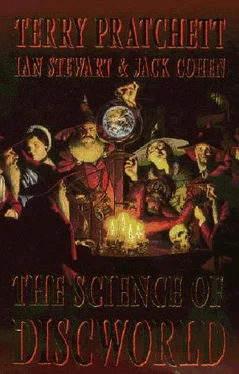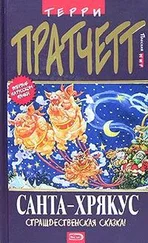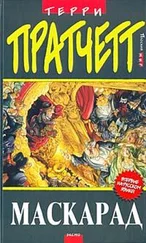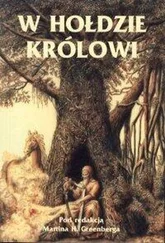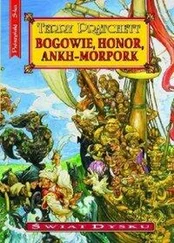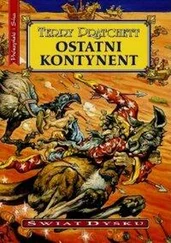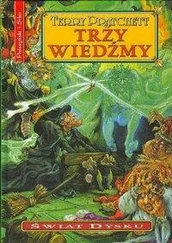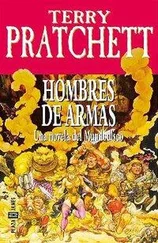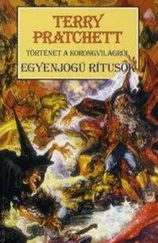Terry Pratchett - Science of Discworld
Здесь есть возможность читать онлайн «Terry Pratchett - Science of Discworld» весь текст электронной книги совершенно бесплатно (целиком полную версию без сокращений). В некоторых случаях можно слушать аудио, скачать через торрент в формате fb2 и присутствует краткое содержание. Жанр: Фантастика и фэнтези, на английском языке. Описание произведения, (предисловие) а так же отзывы посетителей доступны на портале библиотеки ЛибКат.
- Название:Science of Discworld
- Автор:
- Жанр:
- Год:неизвестен
- ISBN:нет данных
- Рейтинг книги:4 / 5. Голосов: 1
-
Избранное:Добавить в избранное
- Отзывы:
-
Ваша оценка:
- 80
- 1
- 2
- 3
- 4
- 5
Science of Discworld: краткое содержание, описание и аннотация
Предлагаем к чтению аннотацию, описание, краткое содержание или предисловие (зависит от того, что написал сам автор книги «Science of Discworld»). Если вы не нашли необходимую информацию о книге — напишите в комментариях, мы постараемся отыскать её.
Science of Discworld — читать онлайн бесплатно полную книгу (весь текст) целиком
Ниже представлен текст книги, разбитый по страницам. Система сохранения места последней прочитанной страницы, позволяет с удобством читать онлайн бесплатно книгу «Science of Discworld», без необходимости каждый раз заново искать на чём Вы остановились. Поставьте закладку, и сможете в любой момент перейти на страницу, на которой закончили чтение.
Интервал:
Закладка:
Myths, not least Jurassic Park itself, have suggested that dinosaurs are not 'really' extinct at all. They survive, or so semi-fact semi-fiction accounts lead us to believe, in Lost World South American valleys, on uninhabited islands, in the depths of Loch Ness, on other planets, or more mystically as DNA preserved inside bloodsucking insects trapped and encased in amber. Alas, almost certainly not. In particular, 'ancient DNA' reportedly extracted from insects fossilized in amber comes from modern contaminants, not prehistoric organisms, at least if the amber is more than a hundred thousand years old.
Significantly, no one has made a film bringing back dodos, moas, pygmy elephants, or mosasaurs, only dinosaurs and Hitler are popular for the reawakening myth. Both at the same time would be a good trick.
Dinosaurs are the ultimate icon for an evolutionary fact which we generally ignore, and definitely find uncomfortable to think about: nearly all species that have ever existed are extinct. As soon as we realize that, we are forced to look at conservation of animal species in new ways. Does it really matter that the lesser spotted pogo-bird is down to its last hundred specimens, or that a hundred species of tree-snail on a Pacific island have been eaten out of existence by predators introduced by human activity? Some issues, like the importation of Nile Perch into Lake Victoria in order to improve the game fishing, which has resulted in the loss of many hundreds of fascinating 'cichlid' fish species, are regretted even by the people responsible, if only because the new lake ecosystem seems to be much less productive. Everyone (except purveyors of bizarre ancient 'medicines', their even more foolish customers, and some unreconstructed barbarians) seems to agree that the loss of magnificent creatures like the great whales, elephants, rhinos and of course plants like ginkgoes and sequoias would be a tragedy. Nevertheless, we persist in reducing the diversity of species in ecosystems all around the planet, losing many species of beetles and bacteria with hardly any regrets.
From the point of view of the majority of humans, there are 'good' species, unimportant species, and 'bad' species like smallpox and mosquitoes, which we would clearly be better off without. Unless you take an extreme view on the 'rights' of all living creatures to a continued existence, you find yourself having to pass judgment about which species should be conserved. And if you do take such an extreme view, you've got a real problem trying to preserve the rights of cheetahs and those of their prey, such as gazelles. On the other hand, if you take the task of passing judgment seriously, you can't just assume that, say, mosquitoes are bad and should be eliminated. Ecosystems are dynamic, and the loss of a species in one place may cause unexpected trouble elsewhere. You have to examine the unintended consequences of your methods as well as the intended ones. When worldwide efforts were made to eradicate mosquitoes, with the aim of getting rid of malaria, the preferred route was mass sprayings of the insecticide DDT. For a time this appeared to be working, but the result in the medium term was to destroy all manner of beneficial insects and other creatures, and to produce resistant strains of mosquitoes which if anything were worse than their predecessors. DDT is now banned worldwide, which unfortunately doesn't stop some people continuing to use it.
In the past, the environment was a context for us, we evolved to suit it. Now we've become a context for the environment, we change it to suit us. We need to learn how to do that, but going back to some imaginary golden age in which primitive humans allegedly lived in harmony with nature isn't the answer. It may not be politically correct to say so, but most primitive humans did as much environmental damage as their puny technology would allow. When humans came to the Americas from Siberia, by way of Alaska, they slaughtered their way right down to the tip of South America in a few tens of thousands of years, wiping out dozens of species, giant tree sloths and mastodons (ancient elephants, like mammoths but different), for example. The Anasazi Indians in the southern part of today's USA cut down forests to build their cliff dwellings, creating some of the most arid areas of the United States. The Maoris killed off the moas. Modern humans may be even more destructive, but there are more of us and technology can amplify our actions. Nevertheless, by the time humans were able to articulate the term 'natural environment', there wasn't one. We had changed the face of continents, in ways big and small.
To live in harmony with nature, we must know how to sing the same song as nature. To do that, we must understand nature. Good intentions aren't enough. Science might be, if we use it wisely.
BACKSLIDERS
GLOOM HAD SETTLED OVER THE WIZARDS. Some of them had even refused a third helping at dinner. 'It's not as if they were very advanced,' said the Dean, in an attempt to cheer everyone up. 'They weren't even using metal. And their writing was frankly nothing but pictograms.'
'Why doesn't that sort of this thing happen here?' said the Senior Wrangler, merely toying with his trifle.
'Well, there have been historical examples of mass extinction,' said Ponder.
'Yes, but only as a result of argumentative wizardry. That's quite different. You don't expect rocks to drop out of the sky.'
'You don't expect them to stay up?' said Ridcully. 'In a proper universe, the turtle snaps up most of them and the elephants get the rest. Protects the world. Y'know, it seems to me that the most sensible thing any intelligent lifeform could do on that little world would be to get off it.'
'Nowhere to go,' said Ponder.
'Nonsense! There's a big moon. And there's other balls floating around this star.'
'All too hot, too cold, or completely without atmosphere,' said Ponder.
'People would just have to make their own entertainment. Anyway ... there's plenty of other suns, isn't there?'
'All far too far away. It would take ... well, lifetimes to get there.'
'Yes, but being extinct takes forever.'
Ponder sighed. 'You'd set out not even knowing if there's a world you could live on, sir,' he said.
'Yes, but you'd be leavin' one that you'd know you couldn't,' said Ridcully calmly. 'Not for any length of time, anyway.'
'There are new lifeforms turning up, sir. I went and checked before dinner.'
'Tell that to the lizards,' sighed the Senior Wrangler. 'Any of the new ones any good?' said Ridcully. 'They're ... more fluffy, sir.' 'Doin' anything interesting?'
'Eating leaves, mainly,' said Ponder. 'There are some much more realistic trees now.'
'Billions of years of history and we've got a better tree,' sighed the Senior Wrangler.
'No, no, that's got to be a step in the right direction,' said Ridcully, thoughtfully.
'Oh? How so?'
'You can make paper out of trees.'
The wizards stared into the omniscope.
'Oh, how nice,' said the Lecturer in Recent Runes. 'Ice again. It's a long time since we've had a really big freeze.'
'Well, look at the universe,' said the Dean. 'It's mainly freezing cold with small patches of boiling hot. The planet's only doing what it knows.'
'You know, we're certainly learning a lot from this project,' said Ridcully. 'But it's mainly that we should be grateful we're living on a proper world.'
A few million years passed, as they do.
The Dean was on the beach and almost in tears. The other wizards appeared nearby and wandered over to see what the fuss was about.
Rincewind was waist deep in water, apparently struggling with a medium-sized dog.
Читать дальшеИнтервал:
Закладка:
Похожие книги на «Science of Discworld»
Представляем Вашему вниманию похожие книги на «Science of Discworld» списком для выбора. Мы отобрали схожую по названию и смыслу литературу в надежде предоставить читателям больше вариантов отыскать новые, интересные, ещё непрочитанные произведения.
Обсуждение, отзывы о книге «Science of Discworld» и просто собственные мнения читателей. Оставьте ваши комментарии, напишите, что Вы думаете о произведении, его смысле или главных героях. Укажите что конкретно понравилось, а что нет, и почему Вы так считаете.
